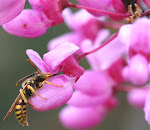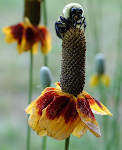We have a new queen!! One of the four queen cells in Elizabeth's hive that the girls raised hatched into a kick-ass new
queenlet who knocked out her rivals and is now happily making babies! I looked for her (as noted a few weeks ago) and couldn't find her - but last Saturday there was lots of new capped and uncapped brood, so she's in business. I am so relieved.
For the sake of lineal clarity (I am making up all kinds of words today), we are keeping the names of each queen
consistent (Elizabeth and Kathryn) but adding qualifiers (like I and II which are boring but useful) and in this case: Boadicea,
becoz my girl had to battle 4 rivals in a truly bodacious fashion). Get it?
However (she said ominously), in neighboring Kathryn's hive I found two swarm cells!
ARRGH! Kathryn has been powering along, raised a ton of brood, and packing away a lot of honey. I have 5 hive bodies on now which is a towering inferno of bees; my chin is level with the top box when I take off the roof.
So as I said, I checked everyone the day before leaving on vacation and there they were: swarm cells.
darnitdarnitdarnit. I scraped off one and then stopped and thought: what the heck? So they swarm. This is a powerful hive, there is a lot of brood waiting and honey stored up, let them go. My efforts last time didn't do anything but make me
queenless for a while, so
ok then: build up the neighborhood bee population.
If I hadn't been leaving for vacation I would have pulled out the frames with queen cells on them and out them in their
own hive box and started a new hive....just for fun. Next time.
When I get home I expect a quieter
beeyard which will be a little sad but: go Kathryn !




